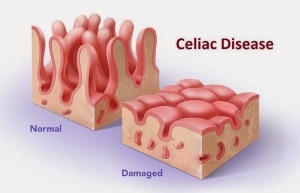What is Celiac Disease?
As we as a society have begun to become more diet conscious, celiac disease is a topic I get asked about a lot here in San Antonio, TX. Celiac disease is defined by the National Institute of Health as a digestive disease that damages the small intestine and 
Celiac disease is an immune reaction to eating gluten. If you have celiac disease and ingest gluten it triggers an immune response in your small bowel. Over time, this immune reaction causes inflammation and damage to the lining of the small bowel that effects its ability to absorb some nutrients. This malabsorption is what leads to the symptoms and problems associated with celiac disease.
What is Gluten?
Gluten is a protein found in wheat, rye, barley and triticale. Common foods that contain gluten are:
- Wheat – bread, soup, pasta, cereal, sauces, salad dressing
- Barley – malt, food coloring, beer
- Rye – rye bread, rye beer, cereal
- Triticale – bread, pasta, cereal
To learn more about gluten, I suggest that you click on this link to read my blog article on gluten free diets.
What Are the Symptoms of Celiac Disease in San Antonio TX?
The symptoms associated with celiac disease can begin at any time in one’s life. While there is no consistent set of symptoms for the diagnosis of celiac disease, and some patients are asymptomatic, the list below represents the most common symptoms:
- Abdominal Pain
- Anxiety
- Behavioral changes
- Bloating
- Diarrhea
- Constipation (more rare)
- Foul-smelling stool (they all stink, I’m talking more stinky than normal here)
- Anemia or low iron
- Skin rashes
- Nausea and vomiting
- Weight loss
How is Celiac Disease Diagnosed in San Antonio, TX?
If you or your physician suspect you have celiac disease the first thing we do is a screening blood test. There are antibodies that exist in the blood of most people that have celiac disease when they are exposed to gluten. These antibodies can be detected with a blood test. However, like most all tests we have in medicine, nothing is 100% accurate. We frequently see false positive blood tests (the test comes back positive in a patient that does not have celiac disease) due to other factors (like other autoimmune disorders). And sometimes we see patients that have celiac disease but don’t produce the antibodies that are picked up on the blood test. So it is a good first screening test to have but if you or your physician still suspect celiac disease is present the “gold standard” test is upper endoscopy.
This involves passage of a small camera through your mouth while you are sedated and into your small bowel where a few 2-3mm size biopsies are obtained. It is painless and quick. The biopsies are then looked at under a microscope and celiac disease can be diagnosed or ruled out.
How is Celiac Disease Treated in San Antonio, TX?
Celiac disease is not curable. There is no pill for celiac disease (yet). It is a disease caused by ingesting gluten containing foods and the treatment is dietary education and avoidance of gluten. There is a lot of educational material available to make this easier and we frequently do this in conjunction with a dietician to get you started on the right track. Most restaurants these days have gluten free selections if you ask and some stores now have gluten free isles to shop in. It’s not easy, but it’s getting easier.

